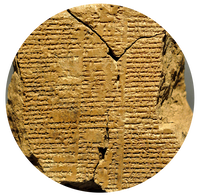Introduction
The Epic of Gilgamesh (anonymous, c. 2100 BC) is an epic poem from ancient Mesopotamia that is often regarded as the earliest surviving great work of literature and the second oldest religious text, after the Pyramid Texts. The literary history of Gilgamesh begins with five Sumerian poems about the king of Uruk, dating from c.2100 BC. Charting the adventures of Gilgamesh and his best friend, Enkidu, the poem addresses universal human themes including love, friendship, loss and the quests for immortality and meaning.
Recommended Reading
The Epic of Gilgamesh (Penguin Classics), trans. George Andrew, Penguin, 2002.
To download a short excerpt, please click on the link below:
Recommended Reading
The Epic of Gilgamesh (Penguin Classics), trans. George Andrew, Penguin, 2002.
To download a short excerpt, please click on the link below:
| fypa1gilgamesh.pdf | |
| File Size: | 33 kb |
| File Type: | |
VIDEO WILL GO HERE.
Questions for Reflection and Discussion
What lessons does Gilgamesh contain about the necessity of relationship in the quest for meaning?
What can the respective developmental journeys of Gilgamesh and Enkidu teach us about what it means to be human?
Does the ending of the text give the reader cause for hope? Why or why not?
What can the respective developmental journeys of Gilgamesh and Enkidu teach us about what it means to be human?
Does the ending of the text give the reader cause for hope? Why or why not?
“Gilgamesh, where are you hurrying to? You will never find that life for which you are looking. When the gods created man they allotted to him death, but life they retained in their own keeping. As for you, Gilgamesh, fill your belly with good things; day and night, night and day, dance and be merry, feast and rejoice. Let your clothes be fresh, bathe yourself in water, cherish the little child that holds your hand, and make your wife happy in your embrace; for this too is the lot of man.”



